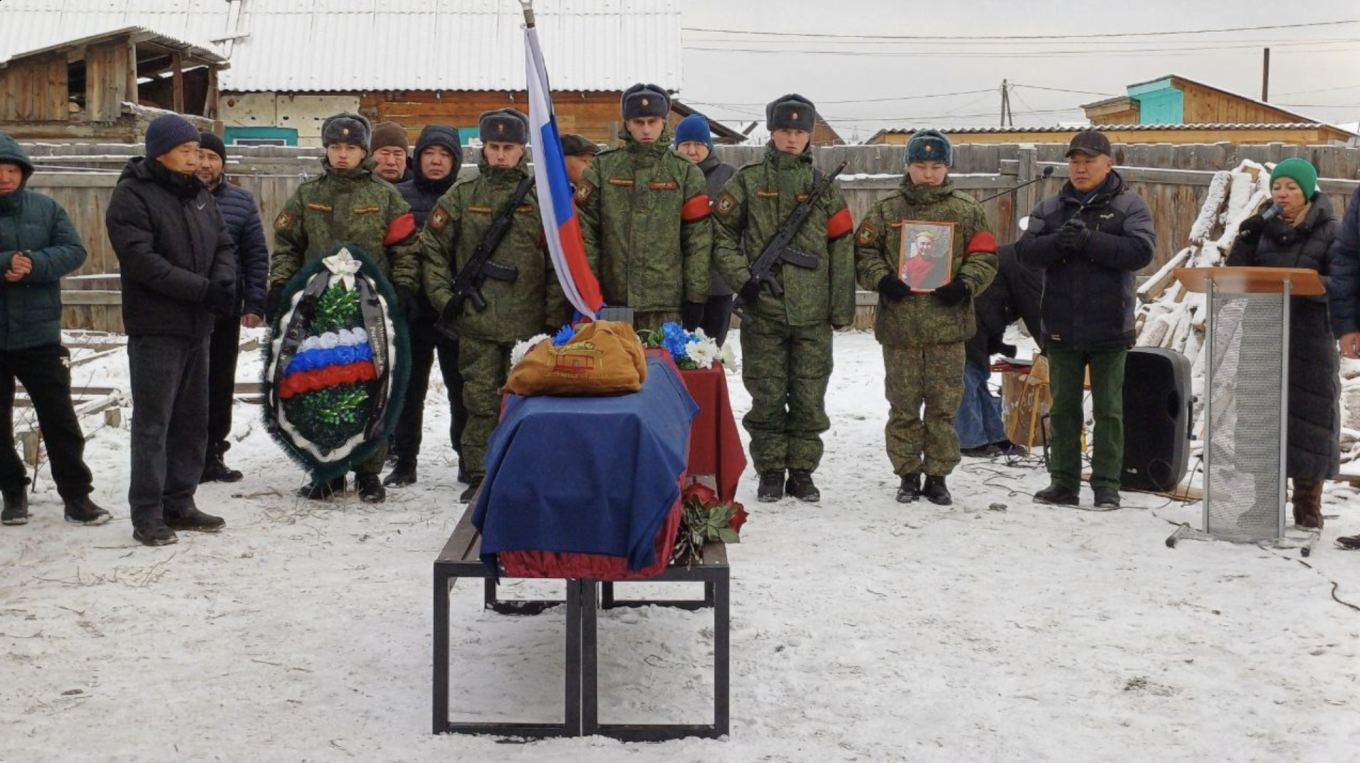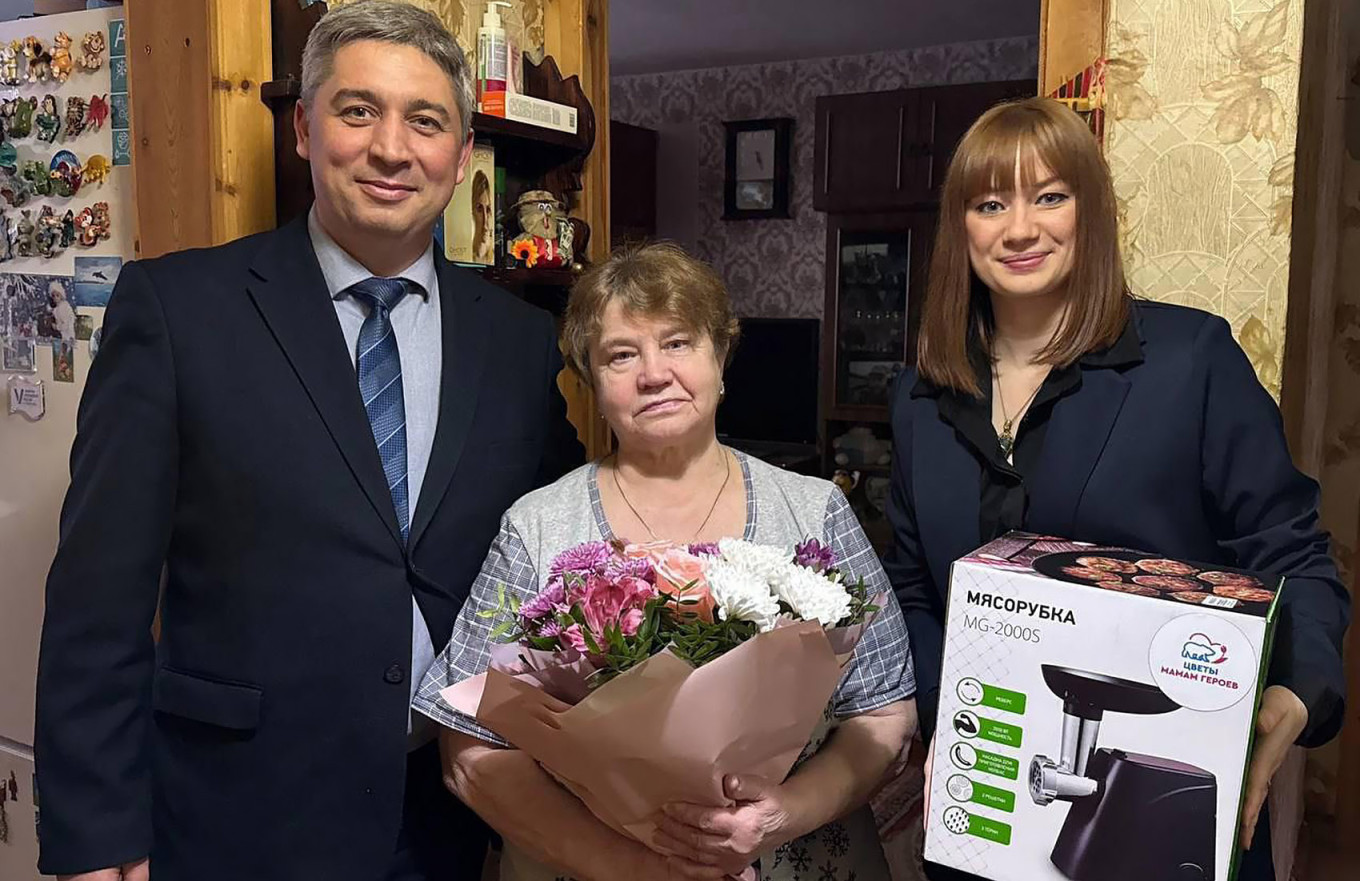
On a November day inRussias Far East, residents of a suburb of Buryatias capital Ulan-Ude gathered alongside local officials to pay last respects to Lama Bair Darmaev, a Buddhist monk killed on the battlefield in Ukraine.He stood up in defense of his homeland with no hesitation.
After signing the contract, he died as a true hero, Svetlana Garmaeva, a deputy of Buryatias Peoples Khural regional parliament, said from a makeshift podium installed on the snow-covered ground.Five soldiers dressed in winter gear stood behind the closed casket with Darmaevs body, carrying his portrait, a wreath and two rifles.He gave his life for our peaceful skies and to ensure that no one would dare to attack our country.
We must be grateful to those stationed at the front lines and do everything possible to bring victory closer, Garmaeva added.The memorial service for Lama Bair Darmaev in Poselye, republic of Buryatia.Ivolginskiy district administration / VKontakteDarmaev, 49, resided at the Temple of Yanzhima Goddess in Buryatias picturesque Barguzin valley for nearly 15 years until he enlisted as a volunteer for the Russian armylast spring.The Lama-turned-soldier died mere months after enlisting while fighting in the ranks of Russias 5th Guards Tank Brigade in Ukraines eastern Donetsk region.Darmaev is not the first Buddhist monk to have died fighting for Moscow in Ukraine.
In February 2023, Lama Khyshikto Tsybikov died from a shrapnel wound in Ukraine.
He had been sent to the front lines during Russias 2022 partial mobilization.Commitment to nonviolence lies at the heart of Buddhist philosophy, as it is the first among the five precepts foundational to Buddhist ethics.
Yet many Buddhist clerks from Russia have endorsed Russias invasion of Ukraine, supported fighters with donations and prayers and even took up arms like Darmaev and Tsybikov.President Vladimir Putin awards the Order of Honor to Damba Ayusheev.Vyacheslav Prokofyev / POOL / kremlin.ruPandito Khambo Lama Damba Ayusheev, the head of Russias Buddhist Traditional Sangha and a friend of President Vladimir Putin backed the full-scale invasion of Ukraine at its outset.
He later went as far as to say that Russian Buddhists are fighting for the Russian and the Slavic world in Ukraine for the sake of saving their Mongolic world.Undesirable religionHeaded by Ayusheev, Russias Buddhist Traditional Sangha is based in Buryatia, one of three Buddhist outposts in Russia alongside the neighboring republic of Tyva and the southwestern republic of Kalmykia.At least 1% of Russias population identifies as Buddhist, according to an April 2022 survey by the Levada Center, Russias last major independent pollster.Russian authoritieshave almost always approached Buddhism with a certain degree of caution, Nikolai Tsyrempilov, a historian of Buddhism at Kazakhstans Nazarbayev University, told the Republic Speaking podcast.They viewed religious communities that had their spiritual headquarters outside of Russia as disseminators of undesirable [foreign] influenceThis included Islam, Catholicism and also Buddhism, Tsyrempilov told Republic Speaking.He noted that Buryatia seemed a particularly problematic case for Russian authorities as its Indigenous residents maintained strong ties with neighboring Mongolia, including through frequent pilgrimages across the border.To ward off the threat of foreign interference, Russian imperial authorities set up an autonomous Buddhist community with a strict power vertical and its own elected head.All Khambo Lamas swore an oath of loyalty to the Russian tsar during the imperial era.
Without this, they could not be elected.
During their election, they had to recite a pledge of allegiance [to the monarch], said Buryat Lama Baldan Bazarov, who left Russia over his opposition to the Ukraine war.Buryat Lama Baldan Bazarov.Courtesy photoDamba Ayusheev, too, took an oath of loyalty to the head of the Russian state when he was elected as the 24th Khambo Lama in 1995.He adheres to this oath because breaking it would not be honorable.
Even in Buddhism, one must remain true to their promises and oaths, Bazarov told The Moscow Times when asked why Ayusheev backed the war.Russias Buddhist Sangha is not the first to seemingly contradict the fundamental precepts of the faith by supporting military action.In World War II-era Japan much like in todays Russia the senior leadership of most Buddhist sects actively encouraged parishioners to enlist in the army, supported the countrys military-industrial complex with donations and endorsed the divine image of the emperor.The southern outlierThough Russias Buddhist Traditional Sangha positions itself as the countrys leading Buddhist organization, religious communities in Tyva and Kalmykia largely function autonomously.Kalmykias Central Khurul is supported by the monastic community and with donations from parishioners.
It has never been dependent on Russias state budget, said Arslan Edgeev, the now-exiled former press secretary of Kalmykias Central Khurul.
Thats why the Kalmyk Buddhist community can stand up to Moscow.In January 2023 Russian authorities labeled Telo Tulku Rinpoche (Erdne Ombadykow), Kalmykias Supreme Lama and the Dalai Lamas representative in Russia and post-Soviet states, a foreign agent, effectively forcing him to resign from the post.The designation came a few months after Rinpoche who left Russia for Mongolia in the wake of the invasion to help thousands of Kalmyks who fled the country alone and with their families to avoid military conscription became the first high-ranking religious leader in Russia to condemn the invasion.A man at a prayer wheel at the Pagoda of Seven Days in Elista, Kalmykia.Erik Romanenko / TASSThis opposition to Moscow didnt start with the war, explained Edgeev.
In the Soviet era, every other Supreme Lama of Kalmykia was subjected to political repressions.
They faced criminal persecution, were sent to labor camps and even executed.
After the Soviet collapse, it seemed to have become a thing of the past, but it didnt.Rinpoche led Kalmyakias Buddhists, the majority faith in the republic, since the 1990s.
He helped stir a revival of the faith after it had been driven underground and repressed by the Soviet authorities.In addition to supervising the construction of multiple temples and training new monks, Rinpoche actively worked to rebuild bridges with Mongolian and Tibetan Buddhists.I think Rinpoches legacy is that Kalmykia still has a relatively independent Buddhist community.
I think that was his major achievement in that role, Edgeev told The Moscow Times.Tendzin Zhoydak (Mutul Ovyanov) replaced Rinpoche as Kalmykias Supreme Lama in February 2023.Though monks in Kalmykia still support soldiers seeking prayers and emotional support, most clergy tell their parishioners in one-to-one interactions that not a single one among them supports this war, according to Edgeev.Edgeev told The Moscow Times that Moscow repeatedly tried to pressure Zhoydak to voice his support for the war by using both threats and promises of large donations to restore local monasteries.But as we can see, these efforts were fruitless, said Edgeev.
When Moscow pressured [Zhoydak] he said that he wouldnt do it because it goes against what he preaches.

 11
11







